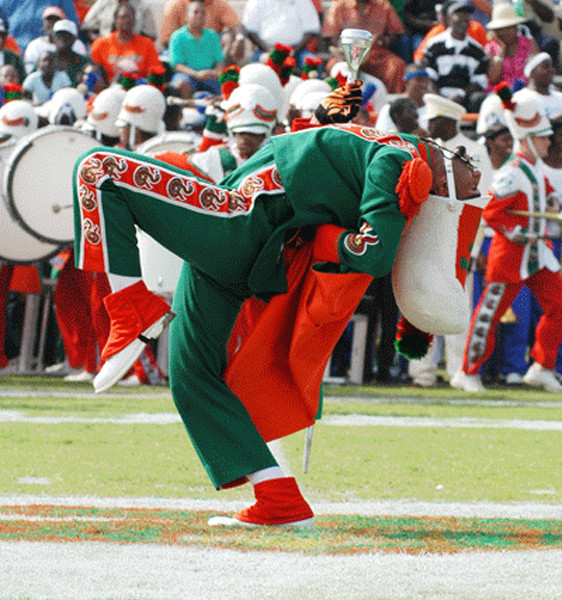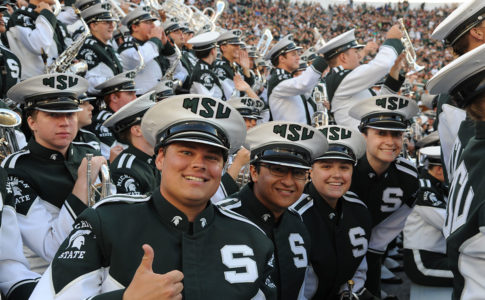With the high-energy, high-emotion style of HBCU bands, sometimes halftime becomes more important and more intense than the football game.
When Jeremy Battles was a preschooler growing up in Florida, he dreamed of being in a marching band. But he didn’t dream of dotting the “i” in “Script Ohio,” and he didn’t dream of playing the trumpet solo in the “Battle Hymn of the Republic” at the University of Georgia, either.
For Battles, currently a 19-year-old business major from West Palm Beach, Fla., the dream remained much closer to home. He dreamed of being a member of the Marching “100” of Tallahassee-based Florida A&M University (FAMU), a prestigious HBCU (Historically Black College or University). In 2007 and previous years, FAMU even played in the Super Bowl halftime show.
“The reason I wanted to join the band is because when I was four years old, I remember seeing the band perform in Miami,” recalls Battles, who plays snare drum. “When I saw them, it got me hooked. I used to put on my brother’s shako—because he was in the band—and get the broomstick and act like I was the drum major.”
A Different Way of Life
The Higher Education Act of 1965 defines an HBCU as “any historically black college or university that was established prior to 1964, whose principal mission was, and is, the education of black Americans, and that is accredited by a nationally recognized accrediting agency or association …”
Recent statistics show that HBCUs, located primarily in the eastern and southern United States, enroll 14% of all African-American students in higher education, but the schools make up only 3% of America’s 4,084 institutions. At a time when predominantly white institutions banned African-Americans from enrollment, HBCUs welcomed the young, gifted and black. Then and now, HBCUs offer choice. Choosing to attend an HBCU means a different atmosphere, culture and way of life.
The same can be said for those who join an HBCU band, which seem to take pre-game, halftime and the “fifth quarter” to a completely different level. Whether it’s the “Human Jukebox” of Southern University—with its 50-plus tunes ready to go for the first game—or the “Sonic Boom of the South” from Jackson State University, HBCU bands and dance teams have a unique, high-energy, high-stepping style. With a passionate and devoted following, HBCU marching bands claim a unique place in America’s music and performance history.
“HBCU bands are the visual representative of the school,” says Christy Walker, co-founder with Michael Lee of The 5th Quarter, a community website devoted to HBCU bands. “Many times the band can be what makes the school known. It’s the prominence; it’s the pageantry; it’s the competition.”
Walker played clarinet in the “Blue & Gold Marching Machine” at North Carolina A&T State University in Greensboro, N.C. When you’re on the field, it’s a battle, she says. And when talking with different HBCU band directors, the same feeling—that pride and competitive streak—makes itself known.
To Be Better Than the Best
Those who want to join the “World- Famed” Grambling State University Tiger Marching Band in Grambling, La., must answer an important question. “We ask each member: ‘What are you going to do to maintain the legacy?’” says director Dr. Larry Pannell. “We don’t want to be among the best; we want to be better than the best.”
That legacy is long and impressive. The NCAA selected the Tigers to represent the Pageantry of Bands section of the NCAA Hall of Champions. The band performed at the first Super Bowl halftime show in the Los Angeles Memorial Coliseum in 1967. It has traveled to Japan and appeared in national ad campaigns, most notably for Coca-Cola and Procter & Gamble. Originally formed in 1926, the band has recently been asked to perform in the Denzel Washington film “The Great Debaters.”
“We’ve gone where there has been no trail and made a path for other HBCUs to follow,” Pannell says. “To whom much is given, much is required. The name is out there; you can sit back and look at what you’ve accomplished, or you can move forward.”
Maintaining the legacy has become an even more important issue now that the university replaced open enrollment with more stringent requirements. As a result, the band’s rank and file has dropped to 202 members from about 300, Pannell says.
Steppin’ High
Ask another HBCU marching band director, and you’ll hear similar pride and passion. Norfolk State University in Norfolk, Va., has a strong reputation for musicianship and innovative drills, says Dr. O’Neil Sanford, now in his 10th year there. The 230-member “Spartan Legion” band is a little bit different from other HBCU bands because it marches a combination of drum corps style and high step.
This year, fans can look forward to more of the same excellence. “We are going to carry on the tradition of the band, emphasizing the musical style and arrangements,” Sanford says. “We are going to enhance the things we’ve been doing over the years.”
It’s “Show” Business
One director put it best when he said that his band provides style and substance—the “show” of show business. “Our marching style is so profound,” says Dr. Lawrence Jackson, who has spent two years as director but more than 15 on staff of the 230-member marching band of the Southern University and A&M College in Baton Rouge, La. “And our brassy sound—we have a strong brass section—there’s just no other sound like it.”
Watching the marching bands becomes as important to fans as watching the game. “The HBCU band brings a lot of flair to a football game,” Jackson says. “You have the whole package; it’s like eating cake with the icing and the filling.”
That whole package must include musicians who are willing to practice almost as much as the football team and who know how to be good students. This type of dedication has won Southern University a wide audience—from a six-week run at Radio City Music Hall to numerous Super Bowl performances.
It’s all about the “know-how and show-how,” Jackson says. “When we recruit students, we look for musicianship, just like the coach looks for athleticism. Can they execute the music?” he asks. “We look for the student who can handle the academics because we want to keep them for at least four years. You have to be a good musician, student and have self-discipline. To be a part of the Southern University Marching Band, you have to be dedicated.”
Classic Showdown
And unlike other college groups, HBCU bands also participate in competitions, sometimes during halftime and sometimes outside of the football games. These “classics” are intense competitions where the prize is not only pride, but also bragging rights and money. They usually involve major rivalries, attract sold-out crowds and are held at major football stadiums.
“When you’re on the field, it’s war,” says Walker, who is now an academic adviser at the University of North Carolina-Chapel Hill. “This is what I see from the inside looking out. Anytime you’re across from another band, it’s a battle.”
It’s so subjective—the wins and the losses, the better and the best—but that seems to add to the fun. Jeremy Battles, of course, would say that FAMU is the best. The Rattler Band is the first and only HBCU marching band to receive the Sudler Trophy, given annually “to recognize a college marching band of exceptional merit.” FAMU received the award in 1985, the fourth band to receive the honor, which can be given only once to each particular band.
“We’re set apart—we’re a little bit more entertaining,” Battles says. “HBCU bands try to put on a show. I don’t know how to really explain the pride—the feel, the atmosphere. The pride that each school has in itself is what drew me in.”
Photo by Victor R. Gaines. All rights reserved.


